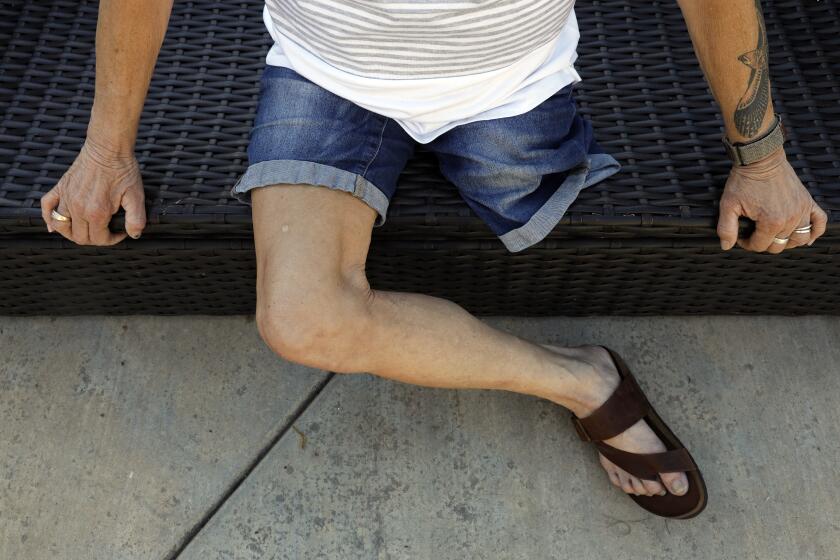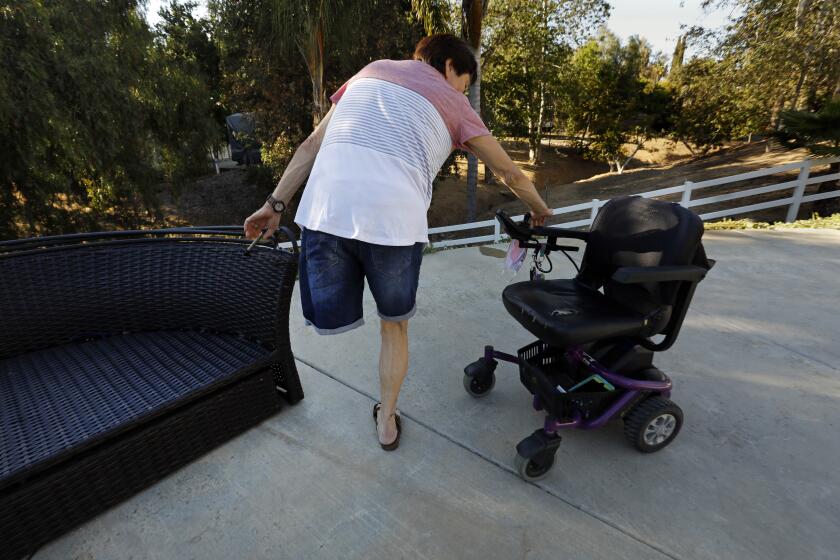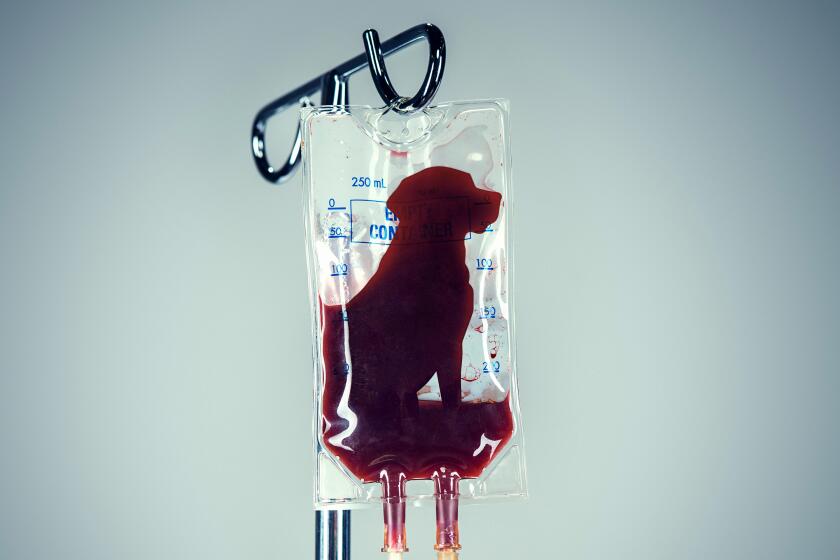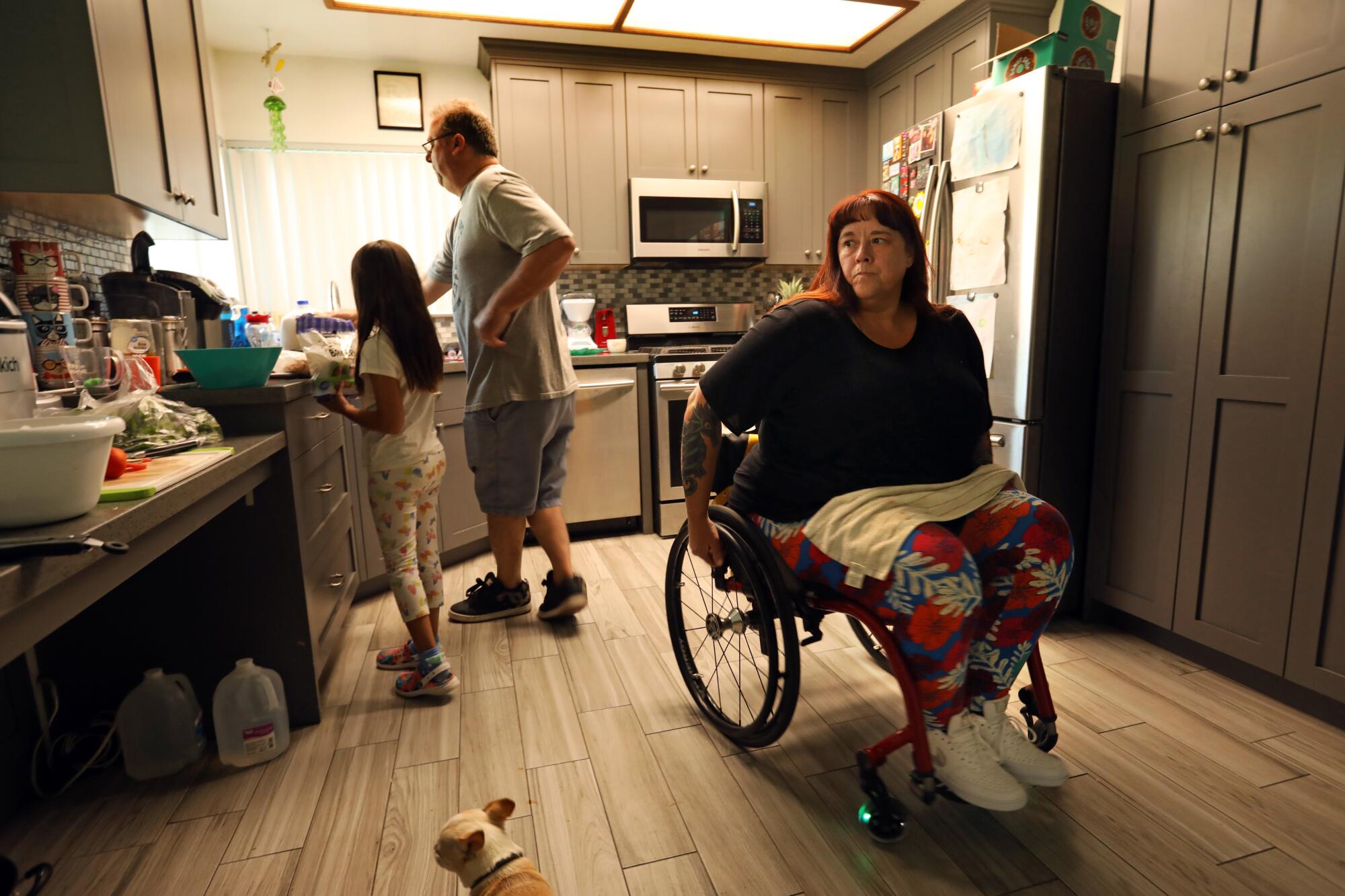
- Share via
Lenora Lewis hoped spinal surgery would relieve her chronic back pain. But when the mother of three from Lancaster awoke from the operation in 2013, she was paralyzed from the waist down, her feet numb but for the horrifying sensation of “a billion ants running through them.”
What she didn’t know then was that her surgeon, Dr. Mukesh Misra, had been publicly accused by the Medical Board of California of operating on the wrong side of another patient’s brain.
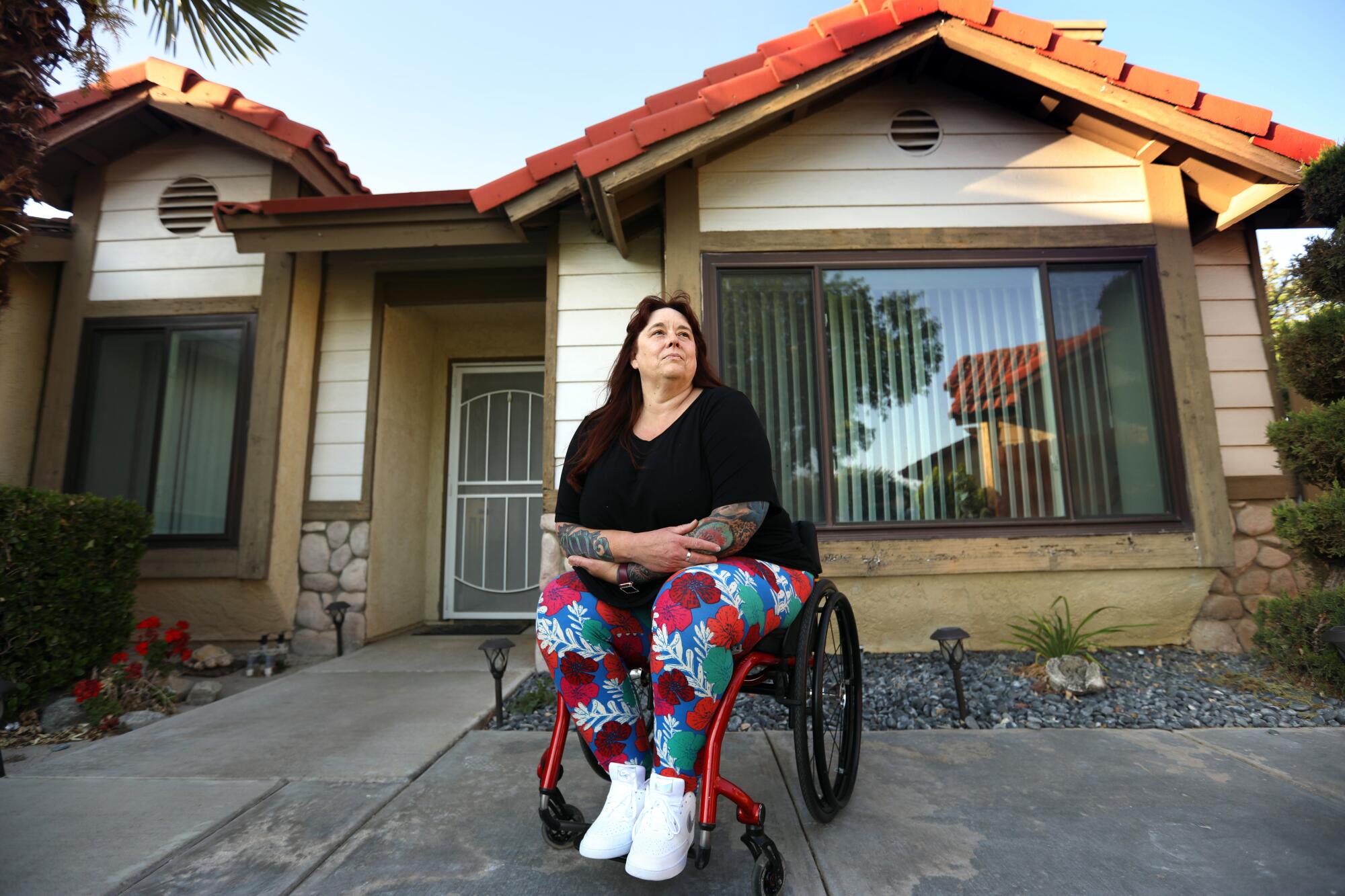
In March, after investigating Lewis’ case — and another in which a 46-year-old woman died of complications from a severed artery discovered minutes after Misra operated on her spine — the medical board revoked his license for gross negligence, but then it stayed the action and placed him on probation, allowing him to keep practicing, which he is doing today.
Misra is among the 10 doctors most frequently found to have committed serious malpractice by the medical board, according to a Times analysis of board actions since 2008. The accusations substantiated by the board include gross negligence that left patients dead, paralyzed or missing limbs. Some doctors also were alleged to have misled patients — and the board’s own investigators — to conceal significant medical errors.
The board found that nine of them committed offenses that warranted license revocation, but it instead gave them lighter punishment — their revocations were stayed and they were put on probation. Four went on to be accused of doing serious harm to other patients after their first board discipline, The Times found in a review of medical board records.
The sanctions are part of a larger pattern of lenient discipline imposed by the board, which has long battled allegations by patients, consumer advocates and others that it goes easy on negligent doctors and fails to protect patients, The Times found.
The 10 doctors include:
- Aytac Apaydin, a Salinas urologist who left a piece of wire in a patient’s bladder, leaving him impotent, in pain and urinating blood for a year. The board revoked his license later, in 2018, for the negligent care of four other patients, but it stayed the order and placed him on probation, allowing him to continue practicing.
- Kevin Ciresi, a Fresno plastic surgeon with five convictions for driving under the influence. The board has revoked his medical license twice and then stayed the actions and put him on probation. He is accused of gross negligence in a pending board action for the death of one patient and the permanent brain damage of another. Ciresi denied wrongdoing in civil lawsuits filed in those cases.
- John Chiu, a Thousand Oaks surgeon who, when threatened with a third revocation, asked for a “grace period” of a few months to sell his practice without the taint of a lost license scaring off buyers. The board allowed it. On the day before he finally surrendered his license, Chiu botched a surgery, according to a pending lawsuit, leaving the patient in excruciating pain and dependent on a walker.
- Lokesh Tantuwaya, a San Diego spinal surgeon whose license has been revoked three times by the board, which placed him on probation each time. His license remains valid as he sits in jail awaiting trial on charges that he took more than $3 million in illegal kickbacks for surgeries in one of the biggest insurance scams in state history.
Board President Kristina D. Lawson and Executive Director William Prasifka declined to be interviewed for this story and refused to answer questions about specific doctors. Instead, board spokesman Carlos Villatoro answered general questions via email.
Protecting the public is the board’s “highest priority,” he wrote. But, whenever possible, it takes action “calculated to aid in the rehabilitation of the licensee.”
If the board comes down too hard or fails to consider a doctor’s efforts to correct faults or fill gaps in medical knowledge, Villatoro said, the panel opens itself to a potentially long, expensive court challenge.
“If the physician is successful, not only will the Board have to pay the physician’s costs, but the imposition of discipline for consumer protection will potentially be delayed or denied,” he wrote.
There is no limit to the number of times a doctor can be placed on probation, Villatoro wrote.
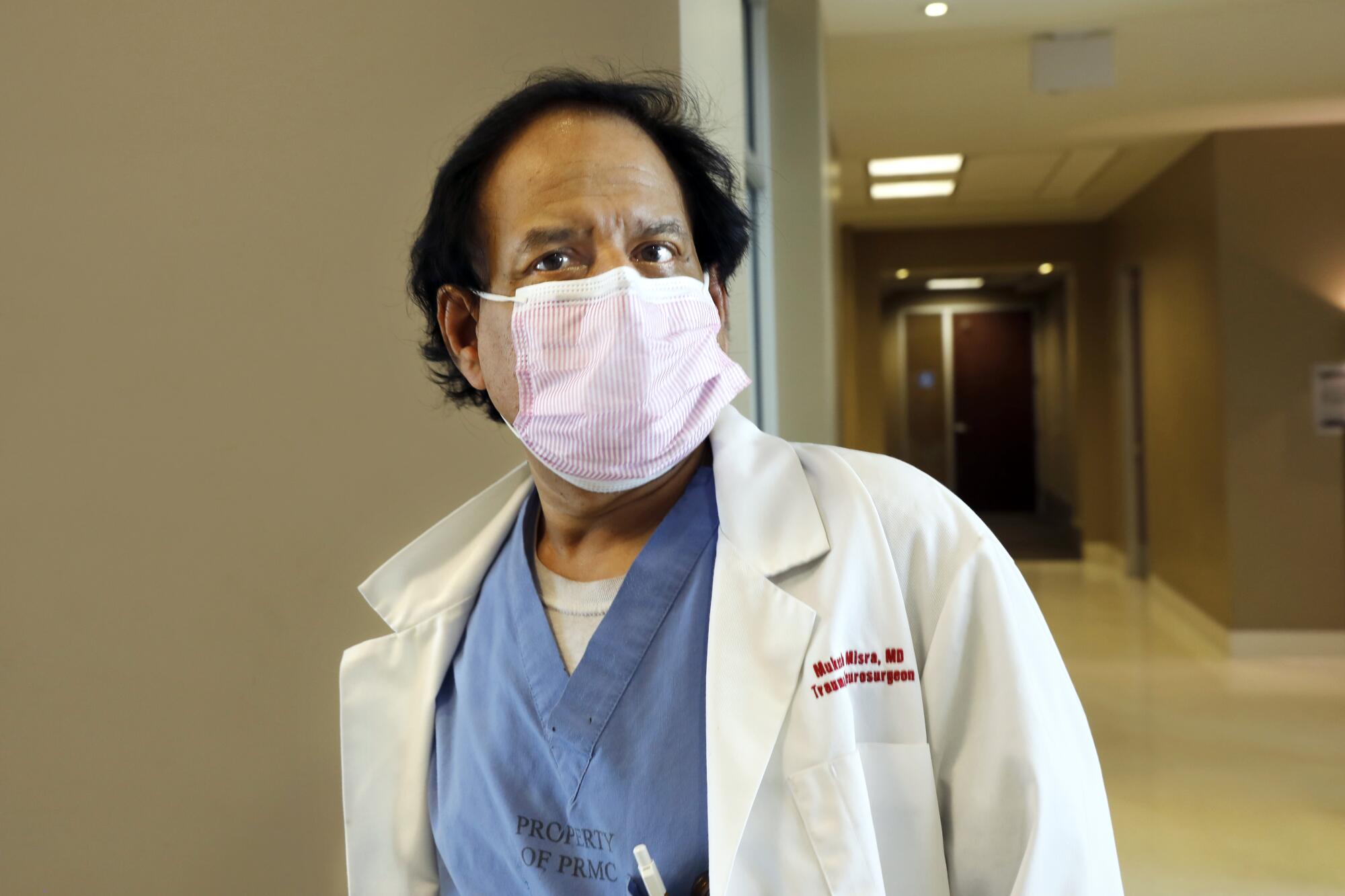
Misra, 59, a Lancaster neurosurgeon, has been one of the most frequently disciplined doctors in the state, according to The Times’ analysis.
The board found reason to revoke his license three times, but in each case it put him on probation instead.
In the case in which he was accused of operating on the wrong side of a patient’s brain, Misra did not admit to the claim. He did admit to failing to maintain accurate records for his treatment of the patient, and as part of a settlement of the board’s accusations, he agreed to undergo remedial education and was issued a public reprimand.
In Lewis’ case, Misra punctured the membrane encasing her spinal cord, causing the protective fluid to leak out, according to medical board records. He also installed a piece of spinal hardware that broke apart, the board said, and then omitted any mention of the mistakes from her medical records.
San Diego spinal surgeon Lokesh Tantuwaya was indicted by the feds for fraud and is in jail awaiting trial. But his medical license is still active.
Misra declined to discuss Lewis’ case or others underlying the medical board’s disciplinary actions. He denied wrongdoing in malpractice lawsuits related to his pending board action and defended his medical skills in a brief interview.
“I feel very confident and comfortable taking care of patients,” he said. “I am safe, absolutely.”
Lewis, 52, remains paralyzed.
“The fact that he’s out and about and still practicing is just amazing to me,” she said. “There is definitely a flaw in the medical board’s system of justice.”
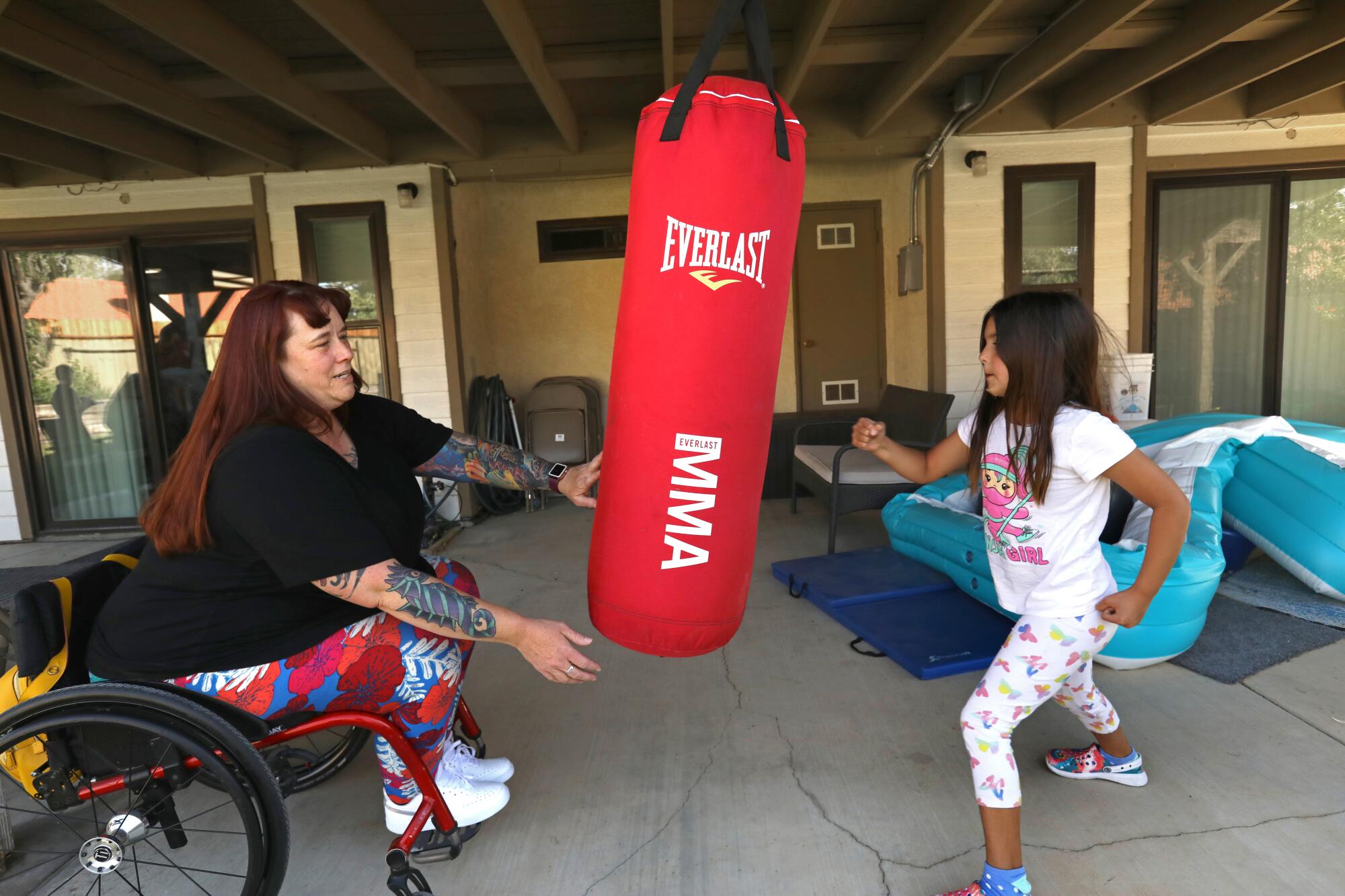
::
The California Medical Board was established in the 1870s to help the public distinguish between trustworthy, educated physicians and snake oil salesmen.
Since then, it has evolved into a 15-member panel, all but two of whom are appointed by the governor. Eight are doctors, the other seven public members. In addition to licensing physicians, the board’s job is the “vigorous, objective enforcement” of the state’s medical regulations designed to protect patients.
But that “vigor” has been questioned by patient advocates, national experts and even a sitting member of the board who contend that the panel too often protects doctors at the expense of patient safety.
The Times’ analysis of medical board records showed it received nearly 90,000 complaints against doctors in the last decade from patients, nurses, fellow physicians and others.
At the board’s most recent quarterly meeting in May, after a long public comment period dominated by complaints from aggrieved patients, Eserick “TJ” Watkins, one of seven non-physicians on the board, summed up the long-simmering, widespread frustration, describing the panel as “tone-deaf.”
“The process is not working for the people, the process is not working for the public, but, unfortunately, it’s working perfectly, perfectly for the doctors,” Watkins told his fellow members.
Watkins, a strength-training and life coach, also criticized his fellow members for deviating from the board’s nonbinding disciplinary guidelines by routinely imposing shorter probations than recommended. He did not respond to requests for interviews.
The Times found that several of the most frequently disciplined doctors have been given probations that are shorter than the guidelines recommend.
In Misra’s most recent disciplinary action, for example, he was accused of gross negligence and other violations, including dishonesty for keeping two sets of records in Lewis’ case, allegedly to conceal the surgical errors that left her paralyzed.
The board’s guidelines for dishonesty directly related to patient care call for a minimum of a stayed license revocation, a one-year suspension and seven years’ probation. The board stayed Misra’s revocation, imposed no suspension and placed him on five years’ probation.
In two previous license revocations, Misra was placed on probation for two years and three years, respectively, when the guidelines recommend at least five years in each case.
Misra’s attorney, Peter Bertling, said the medical board’s deviation from its disciplinary guidelines only affirms his client’s competence.
“If the medical board thought that allowing him to continue to practice put patients at risk for harm, they wouldn’t do it,” Bertling said. “They have an affirmative obligation to suspend or revoke the license of a physician they truly believe is a danger to the public. If they didn’t do that, they would be considered derelict in their duties.”
Patient and consumer advocates take a dimmer view of the board’s actions.
In March, Public Citizen, a Washington nonprofit that advocates for safe and affordable healthcare, ranked California’s medical board 33rd in the country when it comes to imposing serious disciplinary action such as license revocation, suspension and forced surrender.
Staying so many revocations and reducing them to probation is why California ranks so low, said Dr. Sidney Wolfe, Public Citizen’s founder and senior advisor.
“The question is, when in doubt, what do you do? If the doubt is raised by multiple instances of injuring or killing someone because of negligence or incompetence, probation isn’t acceptable,” Wolfe said.
Resources are available, but checking your doctor’s track record can be difficult. Here are some tips.
Claiming the board wants to offer the doctor yet another chance at rehabilitation is “pretty pitiful” and a “dangerous excuse,” Wolfe added. “It amounts to an admission that they are not doing a good job.”
The Times’ analysis of medical board records showed it received nearly 90,000 complaints against doctors in the last decade from patients, nurses, fellow physicians and others.
Of those, 3,100 were substantiated by the board’s in-house investigators and led to disciplinary action. Three-quarters ended in probation or a letter of reprimand. Only 439 — less than 0.5% of the original complaints — ended in licenses being revoked.
No matter how a case resolves, justice isn’t swift. The average time between a complaint and its dismissal or the imposition of discipline is more than three years, according to board records.
And many victims of serious medical errors never file a complaint with the board; they turn to a malpractice lawyer instead. The board often learns about those cases only years later, if the doctor, or his insurance company, pays more than $30,000 to settle a civil lawsuit, triggering a mandatory report.
::
When Stan Gerbrandt walked into a Thousand Oaks clinic last year for surgery to ease pain in his left shoulder and hip, he said, he didn’t know that his doctor, John Chiu, had agreed to the forced surrender of his license the next day.
The medical board had substantiated more accusations of wrongdoing against Chiu than any other physician since 2008, The Times’ data analysis found. Among the charges: gross negligence, performing unnecessary surgery, failing to conduct essential diagnostic tests and being dishonest with the board.

Chiu first came before the board in 2007 after he apparently punctured a 44-year-old woman’s jugular vein with a needle during a procedure under a local anesthetic. She soon stopped breathing. Chiu began an emergency tracheostomy, slitting her throat to make a hole for a breathing tube, then inexplicably stopped. In later testimony, Chiu admitted he was uneasy making the incision because it had been many years since he performed a tracheostomy, according to board records. The woman died.
After conflicting medical testimony — a board expert said the ability to do an emergency tracheostomy is required of neurosurgeons; Chiu’s witnesses said it wasn’t — the board decided Chiu was not grossly negligent in that case.
But the board accused him of negligence in the postoperative care of two other patients: an elderly man whose foot began dragging after back surgery and another man who developed a serious spinal infection that Chiu failed to diagnose. The board revoked Chiu’s license, then stayed the action and put him on probation for three years.
In 2011, the board revoked his license a second time for repeatedly failing to disclose, under penalty of perjury, “at least two medical malpractice lawsuits” filed against him while he was on probation. Once again, the board found grounds to revoke his license but put him on probation instead, according to board records.
In the fall of 2019, five new and troubling cases were brought to the board. In one, Chiu ordered a scan that showed a patient’s pain, sudden weight loss and difficulty swallowing were probably caused by liver cancer that had spread to his throat. Chiu “failed to discuss the results of the CT study with the patient, and instead proceeded with neck surgery,” according to board records.
At that point, when Chiu was 82, the board finally threatened to take his license for good.
Chiu acknowledged the board had a factual basis for the charges and asked for a “grace period” of a few more months to arrange the “unencumbered sale” of his practice without questions about his license scaring away buyers. And he wanted to continue treating patients without them knowing his license was in jeopardy or losing confidence in his surgical ability, according to a lawsuit Chiu filed against the board.
The board agreed to the terms.
Gerbrandt went under Chiu’s scalpel to relieve his left shoulder and hip pain, on the last day of that grace period. It ended in disaster.
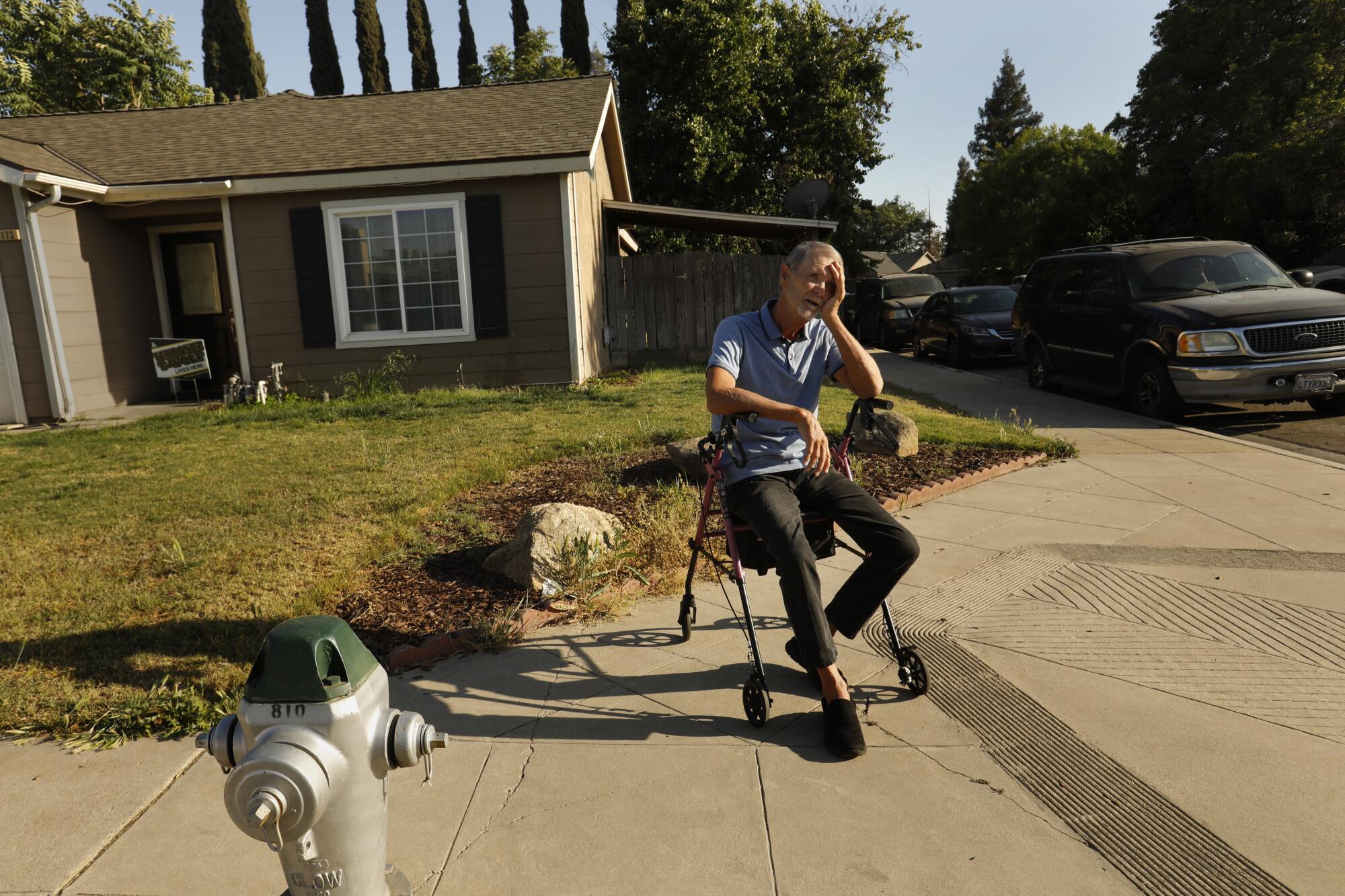
The first thing Gerbrandt noticed as he began to regain consciousness was a stabbing pain in his right foot. A chiropractor himself, Gerbrandt knew immediately that pain on the opposite side of his body meant something had gone horribly wrong with the surgery.
Now he lives with a nearly constant burning sensation that radiates up his right leg, Gerbrandt said. Severe pain in his back, which he didn’t have before the operation, forces him to use a walker. Gerbrandt, 69, said he had been winding down his practice, but the new disabilities hastened his retirement.
“It just seemed like the whole world shut down right after,” Gerbrandt said. “This surgery put a nail in the coffin of my career.”
To determine exactly what went wrong with the surgery, Gerbrandt said, he called Chiu’s office repeatedly asking for his medical records. The assistants who answered told him they couldn’t access the records because the office was closed due to the COVID-19 pandemic — they did not say that, in fact, Chiu had surrendered his license and was no longer practicing, Gerbrandt said.
Gerbrandt filed a malpractice suit, but Chiu still had not produced his medical records more than a year later, Gerbrandt said.
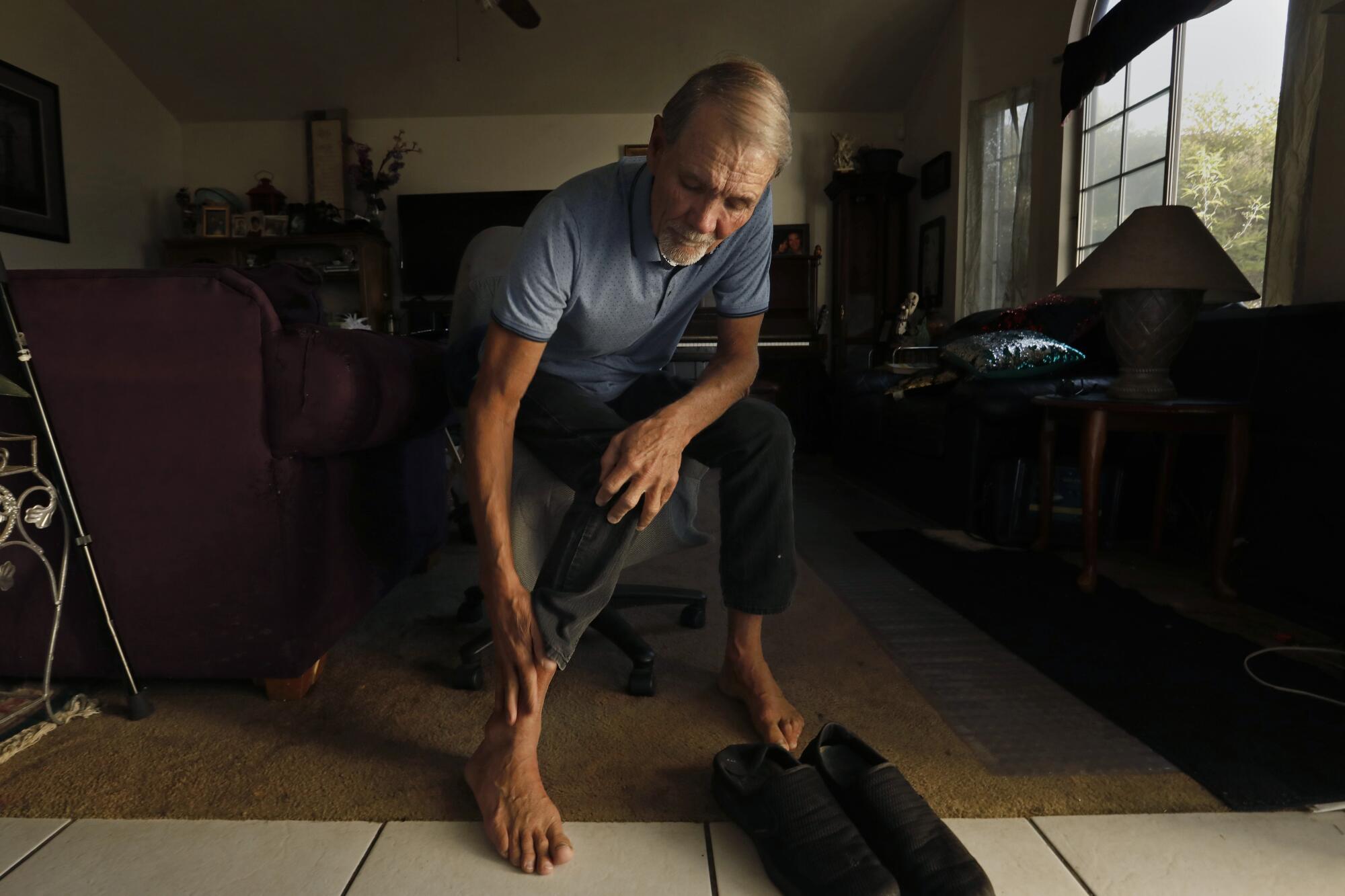
Gerbrandt also wrote a letter to the state medical board warning it of Chiu’s alleged malpractice and asking for help accessing his records. The board sent back a form letter saying an “Enforcement Analyst” would be assigned to review his complaint, but there has been no follow-up.
Chiu did not respond to repeated requests for comment. Several lawyers who have represented him in civil malpractice cases and before the board also did not respond or refused to comment. He has not yet filed a response to the lawsuit.
At least 18 other patients have sued Chiu alleging malpractice in the last two decades. They include a man who claimed he was left impotent and incontinent, and multiple patients whose doctors said the surgeries Chiu performed were unnecessary and ineffective.
::
It’s been years since Joe Puga last saw Salinas urologist Aytac Apaydin, but the 88-year-old remembers him well.
“He left a big piece of wire in my bladder,” Puga said. “I suffered with that for a year. It was a bad experience — a really bad experience.”
Puga, an agriculture consultant from Imperial County whose work takes him around the state, went to Apaydin because of abdominal pain and blood in his urine. In July 2007, the doctor performed a cystoscopy, placing a tube in his urethra and then inserting a wire to guide a tiny camera and laser through it and into his bladder, medical board records state.
Subscribers get early access to this story
We’re offering L.A. Times subscribers first access to our best journalism. Thank you for your support.
During the procedure, Apaydin inadvertently cut the wire with the laser but apparently didn’t realize it. When Puga returned a week later complaining of pain and complications, a radiologist performed a CT scan that showed a “coiled metallic wire” in his bladder, the records state. The radiologist noted it in Puga’s chart and recommended corrective action.
Over the next nine months, Puga came back to Apaydin at least three times for a litany of problems including pain, bleeding, blood clotting, erectile dysfunction and incontinence. At every turn, Apaydin allegedly failed to treat the foreign object inside him, even after having signed off on the radiology report, according to the medical board records.
It was only when Puga saw a different doctor, in late May 2008, that he learned what was causing his problems.
“He said, ‘OK, Joe, let’s start with X-rays,’” Puga recalled. “Two or three days later we got the results, and we looked at the screen and the doctor said, ‘What in the hell is this? We’ve got to get that out of you.’ After he got it out he showed it to me: It was a piece of wire about 6 inches long. I said, ‘Oh, my God.’”
Puga sued Apaydin and his urology practice for negligence and ultimately settled for an undisclosed amount.
The medical board also accused Apaydin of repeated acts of negligence involving Puga and issued a letter of reprimand in 2012, five years after his original surgery.
Apaydin accepted the reprimand after acknowledging that the board “could establish a prima facie case with respect to the charges and allegations,” settlement records show. He accepted a stipulated settlement but did not admit the charges.
It was Apaydin’s second reprimand by the board, which in 2008 had disciplined him for altering records and failing to inform a patient about a drug’s side effects.
Neither Apaydin, 60, nor his attorney responded to multiple phone calls and emails seeking comment for this article.
In 2017, the panel accused Apaydin of gross negligence in the treatment of four patients, including one who suffered kidney failure after the doctor put him on a toxic combination of intravenous medications and then failed to monitor him.
Other allegations included operating on a patient twice in one day, when a single surgery should have sufficed, medical board records show, and rushing to operate on another patient whose kidney stone probably would have passed naturally, without surgery.
The board also accused Apaydin of overprescribing potentially harmful X-rays and other imaging scans — including on a pregnant woman — and excessively using a shock-wave therapy known as lithotripsy to treat kidney stones.
In January 2018, the medical board revoked Apaydin’s license and then stayed the action and placed him on five years’ probation. Board records note that Apaydin again acknowledged the board’s prima facie case and “gives up his right to contest those charges.”
Four days after that order took effect, Apaydin and his partner at Salinas Valley Urology Associates agreed to pay $1.08 million to resolve federal allegations that they submitted false claims to Medicare.
Neither doctor admitted liability.
Apaydin’s license again came under scrutiny in July 2020, when the medical board filed yet another accusation and moved to revoke his probation because of a misdemeanor drunk-driving conviction in Monterey County a year earlier.
The board’s decision on the probation revocation is pending.
::
Misra, the Lancaster neurosurgeon whose spinal operation left Lewis paralyzed, has been sued for malpractice at least 15 times and has one of the longest disciplinary records of any doctor in California.
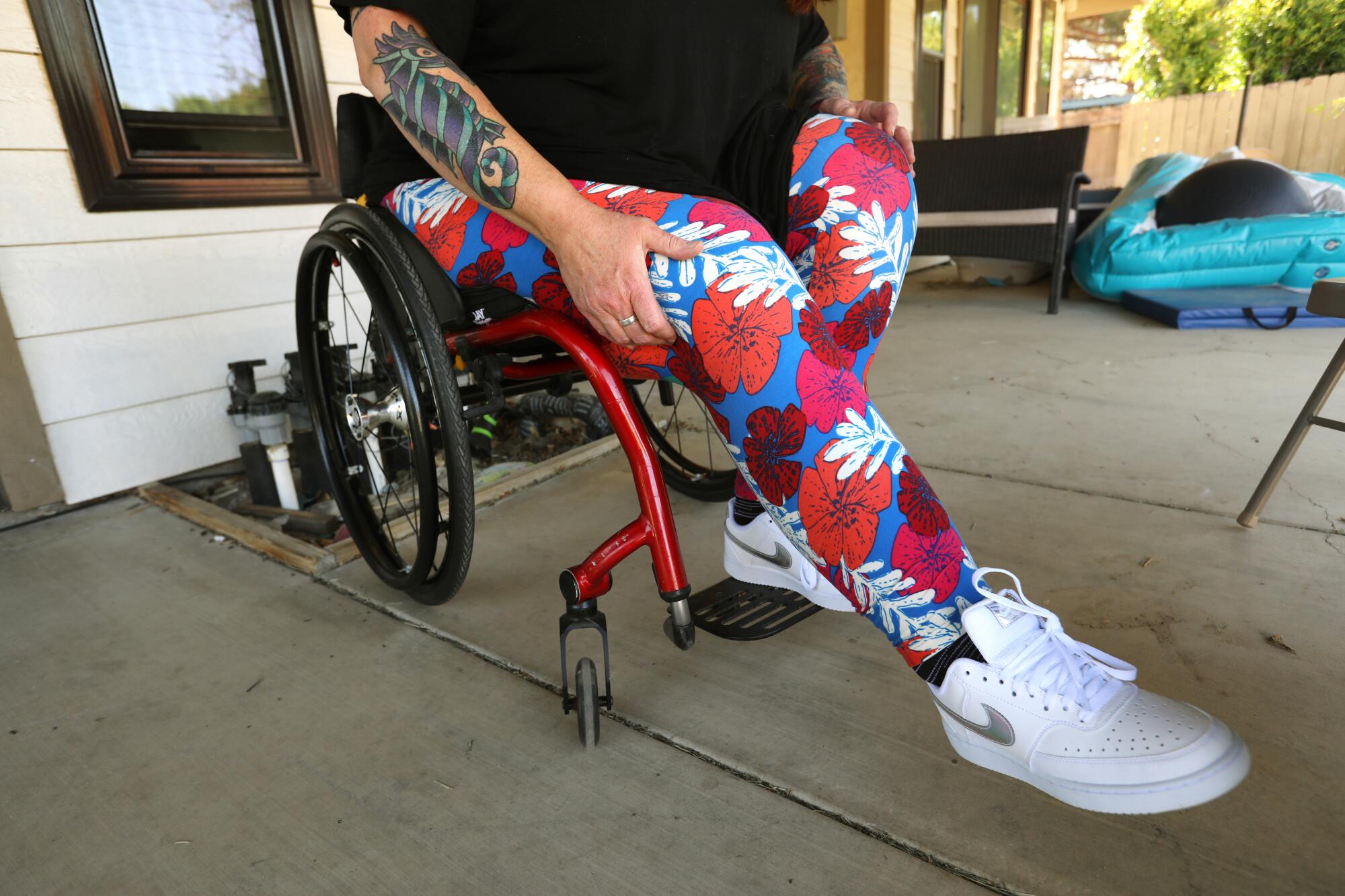
In 2010, the board accused him of gross negligence, incompetence and repeated acts of negligence for operating on the wrong side of a 45-year-old woman’s brain, calling it an extreme departure from the standard of care that required a second surgery.
In a stipulated settlement with the board, Misra admitted only to keeping inadequate records of the surgery and neither denied nor admitted to the other allegations.
The board ordered him to complete education and record-keeping courses and a professionalism program. It then issued him a public letter of reprimand for failing “to adequately document the surgical procedure and the post-operative condition and care of the patient.”
In January 2018, the board revoked Misra’s license but stayed the action and put him on three years’ probation for a botched spinal surgery in which one piece of hardware he implanted dislodged and another fractured. Misra did not disclose the complications to the patient, the board alleged, nor did he make an accurate record of them. The patient, a 70-year-old-man, required a second surgery to correct the first.
In January 2020, the board again revoked Misra’s license, and again stayed the order, extending his probation by two years.
In that case, the regulators accused Misra of gross negligence for operating on the wrong part of a woman’s spine and then failing to own up to his error when it was revealed by X-rays. The patient found out only when she went to another surgeon, and she then had to undergo a second operation to fix it.
Misra acknowledged the prima facie merits of the medical board’s allegations in both cases but did not deny or admit liability, according to his stipulated settlements.
Three months after the second of those disciplinary actions, the board considered two new allegations against Misra, involving Lewis and another patient, that stemmed from surgeries years earlier.
Julie Despres was a Navy wife and mother of four who turned to Misra in 2014 for relief from the torment of degenerative disc disease and lower back pain. He performed a spinal fusion, noting in his operative report that it went well with “no complications.”
But shortly after Misra closed Despres’ incision, he was summoned back to the operating room at Palmdale Regional Medical Center. Her blood pressure had plummeted and her abdomen was swelling, two red flags of internal bleeding.
Since 2016, the California Medical Board has twice revoked Dr. Kevin Ciresi’s license, only to stay the order both times and place the Fresno plastic surgeon on probation.
“She was trying to communicate,” Misra later testified in a deposition. “She was still under anesthetic. She said her belly and her leg hurts. I talked to her and I told her, ‘Let me see what is happening.’”
An ultrasound confirmed the bleeding, and a vascular surgeon was called in to try to stop it. But he was 12 miles away at another hospital, and by the time he arrived, Despres was in cardiac arrest.
The second surgeon discovered that Despres’ iliac artery, which carries blood to the legs, had been cut and was gushing into her abdominal cavity. As others performed CPR, the vascular specialist worked to stanch the flow and repair the artery, according to board records and an operative report filed in a lawsuit.
Despres died the next day.
Her husband, Roland Despres, said in an interview that Misra “had operated on her before, so we had trust in him.” He learned only after his wife’s death that she was but the latest in a string of dire outcomes in Misra’s surgeries.
“He did not have a good history,” Despres said.
Despres said the medical board never contacted anyone in his family for its investigation of Misra, which included an allegation that he failed to take emergency action while Julie Despres bled profusely for 30 minutes waiting for the vascular surgeon.
Misra testified in a deposition that he did not attempt to stop the bleeding himself because he was not trained to do it.
“That is not my territory of expertise,” he said.
Roland Despres, a retired Navy petty officer, wishes someone would have clued him in to the doctor’s record before the operation that took his wife’s life. But because medical board investigations are confidential and can take years to conclude — Misra’s 2016 reprimand came nine years after the error that sparked it; his 2018 probation stemmed from a botched surgery in 2012 — the public often is left in the dark.
“I definitely think [the board] should put their history out there so people can read about them, and if they’ve got something to hide they shouldn’t be in the business,” Despres said.
Despres filed a wrongful-death lawsuit alleging that Misra cut the artery during surgery. In his operative report, the vascular surgeon who was called in to address the bleed said that he found a “70% transection” of the iliac artery, indicating a severe cut.
The medical board accused Misra of gross negligence for failing to recognize that the spinal hardware he installed was in a “potentially dangerous location” that could cause vascular injury.
Misra’s attorney, Bertling, said there was no conclusive evidence that his client caused the bleed during the surgery — even though it was discovered immediately afterward.
The lawsuit ended with a confidential settlement.
At the same time the board was weighing the allegations involving Despres, it also was investigating Lewis’ case.
Misra had treated Lewis’ lower back pain for more than a year when he operated on her spine Sept. 10, 2013.
The medical board accused him of detecting spinal fluid leakage during the operation but failing to investigate its cause. It also alleged that Misra knew a lumbar cage he installed had fractured but did not consider removing it at the time to assess neurological damage.
“Had he fixed it immediately, the damage could have been contained and minimized,” Lewis said in an interview. “Because he let it go, and put in a broken cage, the damage was done.”
The board also accused Misra of dishonesty for keeping two sets of records on the operation. His own records included key details, such as references to the fractured hardware, while the records he submitted to the hospital omitted them — and asserted there were “no complications” in the surgery, the board alleged.
Bertling said the dual records were the result of Misra’s routine editing to make “changes he believes are necessary.” He denied any dishonest intent and Misra did not admit to the allegation before the medical board.
Lewis’ lawsuit alleges that Misra’s actions took a sinister turn when he tried to convince her she had been paralyzed by a stroke, not by his surgical error.
Doctors at Cedars-Sinai Medical Center, where Lewis turned for a second opinion nearly a year after her surgery, blamed her paralysis squarely on Misra’s errors, according to her lawsuit.
Had she known sooner what caused her paralysis, she could have sought corrective surgery. But because of the time lag created by Misra’s deception, her “paralysis became unrepairable and permanent,” her lawsuit alleged.
“I have to work every day to stretch and exercise my body to not experience excruciating pain,” Lewis said in court documents. “These physical and emotional injuries affect every activity of daily living.”
In an interview with The Times, Lewis said her life has changed profoundly since the surgery. For two years afterward, she said, she was in “a really, really dark place” emotionally. She had lost not only her mobility but also her longtime job at a local family restaurant, where she was poised for a management promotion.
“There’s not much room for a wheelchair user in that capacity,” she said.
Misra’s attorney said his medical experts in both the Despres and Lewis cases concluded that the doctor had met the required standard of care.
“Just because there is an unfavorable outcome or complications doesn’t mean there was any negligence,” he said.

Lewis settled her lawsuit in 2017 with a confidentiality agreement that prohibits her from disclosing the amount. But it apparently was large enough to trigger a board investigation of her case.
The allegations in both cases were resolved in November 2020, when Misra and medical board staff agreed on a deal in which his license was revoked for a third time — and for a third time, the revocation was stayed.
Misra acknowledged the “factual basis” for the allegations and agreed to give up his right to contest them, according to his stipulated settlement.
The board placed him on probation for an additional five years and allowed him to continue seeing patients.
If he successfully completes his current disciplinary stint, Misra will have spent about half of his 20 years in practice on probation.
Lewis said she was prepared to testify against Misra if his case went to a hearing, but then a deputy California attorney general, Rebecca Smith, who was acting as the board’s attorney, notified her in March of a settlement placing the doctor on probation.
“She didn’t give me any reason. She just said this is what it is,” Lewis said. “I think it was complete BS. They should have revoked his license. Period. He shouldn’t be allowed to practice. He shouldn’t be allowed to be anywhere near a patient.”
Smith referred The Times’ emailed questions to the attorney general’s press office, which declined to comment.
Lewis said that when she protested that the discipline was not harsh enough, Smith told her, “Don’t worry, he’ll be really inconvenienced” by the sanctions, which include mandatory educational classes.
“He’ll be inconvenienced?” Lewis said. “Every day I have to wake up and deal with the ramifications of what he did to me. Every single day…. I will always be like this.”
Times researcher Scott Wilson contributed to this report
More to Read
Sign up for Essential California
The most important California stories and recommendations in your inbox every morning.
You may occasionally receive promotional content from the Los Angeles Times.
